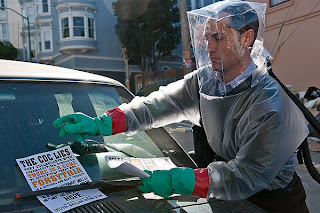Contagion
Directed By:
Steven Soderbergh
Written By: Scott
Z. Burns
Starring: Matt
Damon, Laurence Fishburne, Gwyneth Paltrow, Jude Law, Kate Winslet, Marion
Cotillard, John Hawkes, Jennifer Ehle, Demitri Martin, Bryan Cranston, and
Elliot Gould.
Director of Photography: Peter Andrews, Editor: Stephen
Mirrione, Production Designer: Howard Cummings, Original Score: Cliff Martinez
Rated: PG-13 for seeing
famous people horrifically die.
There’s
a number of minor plot strands throughout Contagion,
a big budget star-packed virus thriller from master filmmaker Steven
Soderbergh, but the one that opens the film is the most curious. We begin with
Gwyneth Paltrow, looking a bit under the weather as she sits in an airport bar.
She answers the phone and talks to a lover that is not her husband after
they’ve quickly met during a layover. The talk has no discussion of “what if
your husband finds out?” or any of that, and while her husband will learn, Ms. Paltrow will be dead, and nothing will come of it. But it's the discussion that Mr. Soderbergh wants us to listen to—it’s rational, good fun, the tone
suggests. Nothing serious, maybe a little emotional, but mostly rational. Too rational almost.
Contagion may be a genre picture, but
the aims of Mr. Soderbergh and writer Scott Z. Burns are both the political
and the philosophical. This is a film about the battle between rationality and
emotions, between doing what’s necessary and doing what’s right. The virus outbreak genre pretty much began and ended with 1995’s Outbreak and there’s not much to say in terms of the dangers
organisms can cause in humans—after all, it’s not exactly very cinematic to
watch people cough and die. But paranoia, as one character says “more dangerous
than any virus,” is a ripe subject, especially as we near the anniversary of
September 11th, as the age of conspiracies and technology has completely changed our way of processing information. Mr. Soderbergh and Mr. Burns create a fascinating
and horrifying portrayal of how our emotions can destroy our bodies.
Mr.
Soderbergh, a director who has done films from the big budget (Ocean’s 11, Traffic) to the extremely intimate (The Good German, The Girlfriend Experience), has often
been described as a cold and meticulous director, and to an extent we see that
in Contagion, though it is often
because he’s taking a scalpel to how our brains think. It turns out that Ms.
Paltrow is “Patient 0” to a new virus that quickly attacks and kills her in a
matter of days. Her husband, played by Matt Damon, rushes her to the hospital
after a seizure, where she promptly, and gruesomely dies. Kate Winslet
comes in from the CDC to help quarantine the outbreak in Minnesota, while
Laurence Fishburne relays directions and steps from the Atlanta headquarters to stop the spread and find the vaccine.
Marion Cotillard heads to Hong Kong to track the origins of the virus, and Jude
Law plays a San Francisco blogger who spreads panic through his online diary,
distrustful of the government but profiting off his own plans.
None
of these stories are very emotional—Mr. Soderbergh and Mr. Burns keep their
distance as they slowly track us through the slowly spreading panic. But often
scenes and choices come between characters making the rational decisions and
the emotional ones. Mr. Law plays his role with an oozing sliminess of disgust
as he preaches to be the truth teller to the people, gnawing of their paranoia (posters memorialize
him as a prophet in a similar visual touch to the Obama-Hope posters). In one
particularly effective scene, one major character realizes she has become
infected. She promptly picks up the phone and tells a hotel manager to promptly
prepare a list of everyone who may have been in her room so they can be scanned
for the infection. It’s a cold and brutal move, but it’s also the completely
rational thing to do in order to be contain the spread. Mr. Soderbergh, acting as his own director of photography, shoots the scene in a brutal white and blue light to reflect the absolute coldness in which her voice delivers this information.
In
today’s age of political rhetoric where media panic makes dimes into dollars, Contagion effectively explores our
national psyche in what true panic would actually mean. Mr. Soderbergh is able
to use his camera as a device of paranoia, always choosing shots that emphasize
touching of doorknobs and buttons and what not. He often emphasizes long shots
that center the characters alone in their own heads, and later shots of what
slowly looks like a post-apocalyptic America are disturbing to say the least.
The excellent electronic score by Cliff Martinez tracks us through the film
without any increase of emotion toward our characters, simply the spread of an
oncoming and impossible epidemic our mind can’t escape. Because the film is so
distant from its characters, a few plot strands do seem untied or unfocused by
their conclusion. It’s unfortunate because Mr. Soderbergh and Mr. Burns seem
conflicted on what their message should be.
However,
like 2008’s The Girlfriend Experience
became an allegorical snapshot for the financial crisis, Contagion does the same for the age of Internet society where
tweets now travel faster than earthquakes. What would happen if a virus as
powerful as the one depicted in the film was unleashed? It’s hard to say it
wouldn’t be so different that what we see, as Mr. Soderbergh and Mr. Burns have
taken a cold hard reading of the rapidly increasing pulse of American society.
It’s no longer the virus we should be afraid of, but ourselves.



1 comment:
I've seen a lot of movies with cases like this. And one of their main reason is that they lack on minor things like canadian vitamins or supplements. Though the movies project serious diseases, I still think that ignoring minor things like this are not helpful. Be mindful of your health.
Post a Comment